The Night Lies Bleeding by M.D. Lachlan
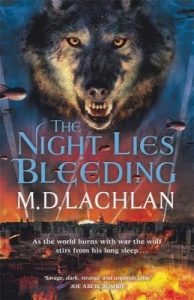 In its opening, The Night Lies Bleeding reminded me of The Last Werewolf by Glen Duncan.
In its opening, The Night Lies Bleeding reminded me of The Last Werewolf by Glen Duncan.
We meet Endamon Craw looking out over the London blitz in World War II. Like Duncan’s hero Jacob Marlowe, Craw’s curse has given him a longevity that he finds burdensome and human associates/servants for whom he has a lordly (almost feudal) attitude. “Craw sensed his dislike and was pleased. That was generally the level on which he preferred to deal with humans, to watch them to their graves without too much in the way of regret.”
However, Craw’s affliction quickly diverges from lycanthropic norms. The wolf does not rise within him at every full moon, or fade at the coming of the day. Craw laughs in recollection of a horror movie when Bela Lugosi drops behind a sofa and then rises a few moments later in full and instant lupine form. The wolf lies dormant in Craw, slowing waking up to creep into his psyche; his transformations are more subtle and can be held at bay, and his reversion to human form – as far as I can gather – is more like a Time Lord’s regeneration than a restoration of the entire person that he was. Certainly, despite a millennium-long life of perpetual youth, Craw’s recollections of those times are fragmentary – outcrops of memory to which his consciousness clings.
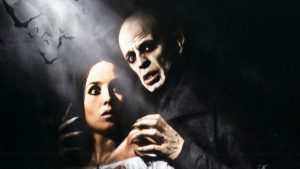
Lachlan’s protagonist’s situation is reminiscent of Nosferatu’s.
Most prominent in those memories is the lost love of his youthful humanity – a motif which put me in mind of Nosferatu. The original Dracula was haunted through the ages by his lost, driven by his search for her and seeing her reincarnated in different women. Craw’s thoughts too swirl around the enduring love of his life, but without an immediate drive to action.
The immediate crisis arises from a sequence of horrific midland murders in which the police not so much enlist as conscript Craw’s support, his role as austere academic being thought to be of benefit to the constabulary in the peculiar ritualistic circumstances of the case.
Lachlan then opens a second story strand in a remote and ancient German fortress. A blundering joker and unintentional soldier Max Voller finds he has talked himself and his wife Gertie into a dangerously privileged assignment working with the SS in researching and weaponising psychic and occult phenomena.
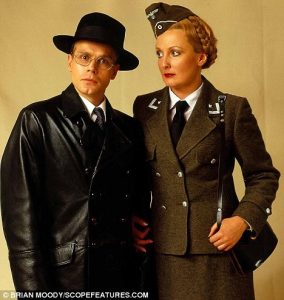
Meanwhile, Max and Gertie put our reviewer in mind of the inept Nazis from British TV show ‘Allo ‘Allo!
The author treads warily into Nazi history. I studied it at A-level and remember being horrified at the ease with which the fragile skein of humanity could be stripped from everyday people, turning them into monsters more horrific than any werewolf. The grotesque and the absurd combine as the castle and its occupants make their mark on Gertie and Max. In some respects it had me thinking of the Indiana Jones films – particularly the first one: Nazis seeking to harness occult or mythic power to their own battle ends. In other respects – particularly with regard to the crocodile – Lachlan made me think of the TV series “‘Allo ‘Allo!” with its portrayal of obsessive but monumentally inefficient SS and Gestapo officers.
But also, again and again the pervasive brutality of the castle brought me back to the horrific reality of those times, the dehumanisation of human beings. Only today via Facebook I found a post on how drunkenness fuelled this brutality, with one SS officer celebrating in a bar his thousandth execution – as the article put it, “literally drunk on killing.” Lachlan pulls no punches in showing us the howling maelstrom of evil against which only a brave man can stand.
In the nightmare of Nazi quasi-philosophy, Max makes a comment that resounds for our time: “Max had reasoned that it is immaterial if an argument is right or wrong. If it is believed, it is right. If it is disbelieved it is wrong.”
There are other lines that capture the horror of being with the SS. Like this: “These jokes, these echoes of a normal life, seemed to swim in his mind, just out of reach.”
Or this. “There was nothing to be said. As so often under the Nazis, they were making the most of a bad lot. Better to keep the frustrations inside than to voice them. In some ways talking about them seemed to give them life.”
Initially, the two threads with two clear leads – Endamon and the occult murder investigation in the midlands, Max and the experimental atrocities in Nazi Germany – jostle along side by side. Myth and magic take second place to plot and people. But about halfway through, the tangled but tangible threads of plot become dreamlike wisps; one character enters a trance, and both reader and story follow them into a half-world – baffling, captivating but somehow insubstantial.
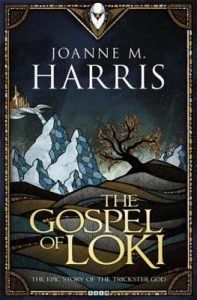 The jaws of wolves have held a grip on human imagination throughout time, birthing stories like Red Riding Hood and legends like werewolves. Perhaps that is why in Norse mythology it was Fenrir the wolf swallowing the sun that heralded the start of Ragnarok. Lachlan’s tale steps through a curtain to dance with Norse deities, and the rest of the story slips in and out of this unseen half-world that occupies the same space and time as the real world. Fresh from having read Joanne Harris’s The Gospel of Loki, I found jarring jolts of recognition as some more obscure Norse legends stepped out of the pages of Lachlan’s book.
The jaws of wolves have held a grip on human imagination throughout time, birthing stories like Red Riding Hood and legends like werewolves. Perhaps that is why in Norse mythology it was Fenrir the wolf swallowing the sun that heralded the start of Ragnarok. Lachlan’s tale steps through a curtain to dance with Norse deities, and the rest of the story slips in and out of this unseen half-world that occupies the same space and time as the real world. Fresh from having read Joanne Harris’s The Gospel of Loki, I found jarring jolts of recognition as some more obscure Norse legends stepped out of the pages of Lachlan’s book.
This abrupt segue takes Craw’s already different werewolf far away from the conventional myth. In reflecting on his becoming a werewolf, Craw observes:
“There, visions and songs had streamed through his mind. At first he had thought they were an expression of something inside him. Only later, in anger and in blood, had he known the truth – he was an expression of them, the servant and victim of a magic as old as time.”
Unlike Duncan’s Jacob Marley, Craw’s lycanthropy is not a form of schizophrenia, nor even of possession. It is of being a vessel for something far more powerful, a fragmentary expression of a divine power. At times, the wolf that is the passenger in Craw demands – insists – on something for “myne appetites.” And Craw is not the only character to be – permanently or temporarily – an intrusion of the divine into the mortal world.
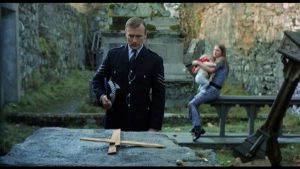
Like The Wicker Man, Lachlan’s tale features a policeman struggling to fight the occult with religious faith.
At the same point as the plot slips into this shadowy otherworldly phase, the focus spreads wider. (Eek – I’m a physicist; how could I have said that?) Characters into whose heads we have occasionally hopped for a paragraph or two begin to command whole pages and chapters, while Max and Craw shrink back. Inspector Balby, not quite PC Plod, begins to piece the story together despite the long shadow the occult casts over his devout and vociferous Christianity. As he steps up to play his part in the brewing multi-sited denouement, I was reminded of poor Edward Woodward’s character in the Wicker Man, the devout policeman fighting paganism with faith. The reader will have to find to what extent he – or indeed anyone else – succeeds.
The Night Lies Bleeding is a difficult book to review, with its complex yet diaphanous plot – like filaments of a spider’s web against which I hesitated to brush too hard. At times the reader is grounded in the brutal realities of World War II, at others floating in almost Dali-ish surrealism. Nonetheless, the writing is speckled with so many lovely lines I found myself noting, and the story held me to the end.
“Smell is the sense that is most linked to memory. Even the dull nostrils of humans are gateways to the past, to kisses we had forgotten, angers we had thought quenched.”
“He had the demeanour of a man who could be smacked over the head with a spade without it disturbing his breakfast.”
There were stylistic features that bothered me a bit. The head-hopping points of view within a scene unsettled me. There are other occasions where characters seem to be doing a lot of telling so the reader can catch up what had been happening out of Craw’s sight. These tracts of exposition felt like a Penn and Teller magic show revealing how the trick was done, rather than finding a way for the reader or the protagonist to discover it. However, I’m not sure how it could have been done differently, for this is a uniquely structured tale that needs must defy convention in the telling.
In the end, however, The Night Lies Bleeding is embedded in Norse mythos and Norse mythos is embedded in it – the wheel of fate turns inexorably towards Ragnarok and beyond, as cycles inexorably do. The question is only who will get crushed beneath the wheel of fate, who will escape, and what will any of them leave behind.
It was a girl’s voice, silent now for a millennium or more, speaking at his ear.
“Then what will they say of me?”
“They will say that you loved and were loved.”
“Is that enough?”
“It would do for me.”
